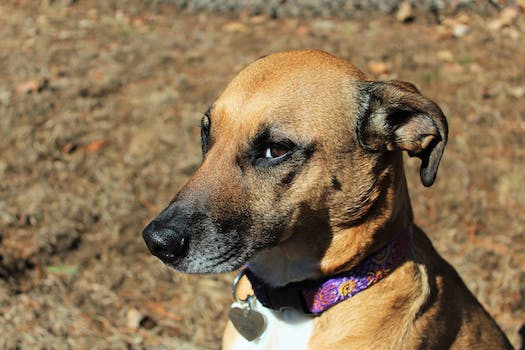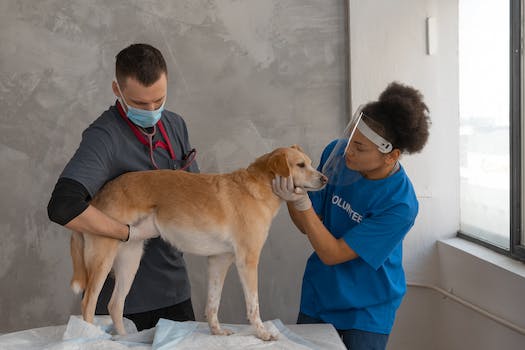

"Expert Tips: A Guide to Cleaning Your Dog's Teeth - Unleash a healthier smile for your furry friend!"
Introduction
Expert Tips: A Guide to Cleaning Your Dog's Teeth is a comprehensive resource for pet owners who want to ensure their furry friend's oral health is in top condition. This guide provides valuable information on the importance of dental care for dogs, the consequences of neglecting it, and step-by-step instructions on how to properly clean your dog's teeth. With tips from veterinary experts, this guide is an essential tool for any responsible pet owner.
The Importance of Regular Dental Care for Dogs
Expert Tips: A Guide to Cleaning Your Dog's Teeth
As a dog owner, you want to ensure that your furry friend is healthy and happy. One aspect of your dog's health that is often overlooked is dental care. Just like humans, dogs need regular dental care to prevent plaque and tartar buildup, which can lead to serious health issues such as gum disease, tooth decay, and even heart disease. In this article, we will provide expert tips on how to clean your dog's teeth and the importance of regular dental care for dogs.
First and foremost, it is important to start dental care early in your dog's life. Puppies are more likely to accept teeth cleaning as a normal part of their routine if it is introduced at a young age. Begin by gently massaging your dog's gums with your finger to get them used to the sensation. Once they are comfortable with this, you can introduce a toothbrush and toothpaste specifically designed for dogs. Human toothpaste can be harmful to dogs, so it is important to use a product that is safe for them.
When brushing your dog's teeth, use a circular motion and be sure to reach all areas of the mouth, including the back teeth. It is recommended to brush your dog's teeth at least two to three times a week, but daily brushing is ideal. If your dog is resistant to having their teeth brushed, there are alternative options such as dental chews and toys that can help reduce plaque and tartar buildup.
In addition to regular brushing, it is important to schedule regular dental check-ups with your veterinarian. Your vet can perform a thorough cleaning and check for any signs of dental issues. They can also provide guidance on the best dental care routine for your dog.
Another important aspect of dental care for dogs is their diet. Feeding your dog a balanced diet that includes crunchy kibble can help keep their teeth clean. Avoid feeding your dog table scraps, as this can lead to plaque buildup and other dental issues.
It is also important to be aware of the signs of dental issues in dogs. These can include bad breath, difficulty eating, excessive drooling, and swollen or bleeding gums. If you notice any of these signs, it is important to schedule a visit with your veterinarian as soon as possible.
In conclusion, regular dental care is essential for your dog's overall health and well-being. By following these expert tips, you can help prevent dental issues and ensure that your furry friend has a healthy and happy smile. Remember to start dental care early, brush your dog's teeth regularly, schedule regular check-ups with your veterinarian, and feed your dog a balanced diet. With a little bit of effort, you can keep your dog's teeth clean and healthy for years to come.
Step-by-Step Guide to Brushing Your Dog's Teeth

Expert Tips: A Guide to Cleaning Your Dog's Teeth
As a dog owner, you know that your furry friend's health is a top priority. One aspect of their health that is often overlooked is dental care. Just like humans, dogs need regular teeth cleanings to prevent plaque buildup, gum disease, and other dental issues. In fact, according to the American Veterinary Medical Association, by the age of three, most dogs have some form of periodontal disease. But don't worry, with a little bit of knowledge and the right tools, you can easily keep your dog's teeth clean and healthy.
The first step in cleaning your dog's teeth is to gather the necessary supplies. You'll need a toothbrush specifically designed for dogs, toothpaste made for dogs (never use human toothpaste as it can be harmful to your pet), and some patience. It's important to start slowly and make the experience as positive as possible for your dog. Begin by letting them sniff and lick the toothbrush and toothpaste, and then gently lift their lips to expose their teeth.
Once your dog is comfortable with the toothbrush and toothpaste, it's time to start brushing. Use a circular motion and be sure to brush all surfaces of the teeth, including the front, back, and chewing surfaces. Pay special attention to the back teeth, as these are often the most neglected and prone to plaque buildup. It's also important to brush along the gum line, as this is where bacteria can accumulate and cause gum disease.
If your dog is resistant to having their teeth brushed, there are a few tricks you can try. One is to use a finger brush, which is a small, soft brush that fits over your finger. This can be less intimidating for your dog and easier for you to maneuver. Another option is to use dental wipes, which are pre-moistened with a cleaning solution and can be used to wipe down your dog's teeth and gums.
In addition to brushing, there are other ways to help keep your dog's teeth clean. Feeding them a diet that includes crunchy kibble can help scrape away plaque, and providing them with dental chews or toys can also promote dental health. It's also important to schedule regular dental check-ups with your veterinarian, as they can provide professional cleanings and identify any potential issues.
Cleaning your dog's teeth may seem like a daunting task, but with the right tools and a little bit of patience, it can become a regular part of your dog's grooming routine. Not only will it help prevent dental issues, but it will also freshen their breath and improve their overall health. So take the time to brush your dog's teeth, and you'll both be smiling in no time.
Choosing the Right Dental Products for Your Dog
As a dog owner, you know that your furry friend's health is a top priority. One aspect of their health that is often overlooked is dental care. Just like humans, dogs need regular dental cleanings to prevent plaque and tartar buildup, which can lead to gum disease and other health issues. But with so many dental products on the market, it can be overwhelming to choose the right ones for your dog. Here are some expert tips to help guide you in selecting the best dental products for your furry friend.
First and foremost, it's important to choose products that are specifically designed for dogs. Human toothpaste and dental products can be harmful to dogs, so it's crucial to use products that are safe for them. Look for toothpaste that is formulated for dogs and has a flavor that they will enjoy, such as chicken or beef. This will make the teeth cleaning process more enjoyable for your dog and increase the likelihood that they will cooperate.
Another important factor to consider is the size and shape of your dog's mouth. Smaller dogs may require smaller toothbrushes or dental wipes, while larger dogs may need larger brushes or dental chews. It's important to choose products that are the right size for your dog's mouth to ensure that they are effective in cleaning their teeth.
Dental chews are a popular option for many dog owners, as they are an easy way to help keep your dog's teeth clean. However, not all dental chews are created equal. Look for chews that are specifically designed to reduce plaque and tartar buildup, and that have been approved by the Veterinary Oral Health Council (VOHC). These chews have been tested and proven to be effective in promoting dental health.
In addition to dental chews, there are also water additives and dental sprays that can help keep your dog's teeth clean. Water additives are added to your dog's water bowl and help to reduce plaque and tartar buildup. Dental sprays can be sprayed directly onto your dog's teeth and gums to help freshen their breath and reduce bacteria. These products can be a great addition to your dog's dental care routine, but should not be used as a replacement for regular teeth cleanings.
Finally, it's important to establish a regular teeth cleaning routine for your dog. Just like humans, dogs need regular dental cleanings to maintain their oral health. Aim to brush your dog's teeth at least two to three times a week, and schedule regular dental check-ups with your veterinarian. By establishing a routine, you can help prevent dental issues and keep your dog's teeth healthy and clean.
In conclusion, choosing the right dental products for your dog is an important aspect of their overall health. Look for products that are specifically designed for dogs, are the right size for your dog's mouth, and have been approved by the VOHC. Consider adding dental chews, water additives, and dental sprays to your dog's dental care routine, and establish a regular teeth cleaning schedule. By following these expert tips, you can help ensure that your dog's teeth stay healthy and clean for years to come.
Natural Remedies for Maintaining Your Dog's Oral Health
Maintaining your dog's oral health is essential for their overall well-being. Just like humans, dogs can suffer from dental problems such as plaque buildup, gum disease, and tooth decay. However, with the right care and attention, you can keep your dog's teeth clean and healthy. Here are some expert tips to help you get started.
Firstly, it's important to establish a regular dental care routine for your dog. This means brushing their teeth at least two to three times a week. You can use a toothbrush specifically designed for dogs, or a finger brush that fits over your finger. Be sure to use toothpaste that is formulated for dogs, as human toothpaste can be harmful to them.
When brushing your dog's teeth, start by gently lifting their lips to expose their teeth and gums. Use circular motions to brush each tooth, paying special attention to the back molars where plaque tends to build up. Be patient and take your time, as some dogs may need to get used to the sensation of having their teeth brushed.
In addition to brushing, there are other natural remedies you can use to maintain your dog's oral health. For example, you can give them dental chews or toys that are designed to clean their teeth as they chew. These can be a great way to keep their teeth clean in between brushings.
Another natural remedy is to add a dental supplement to your dog's diet. There are many supplements available that contain ingredients like enzymes and probiotics that can help prevent plaque buildup and promote healthy gums. Be sure to consult with your veterinarian before adding any supplements to your dog's diet.
You can also use coconut oil as a natural toothpaste for your dog. Coconut oil has antibacterial properties that can help fight plaque and freshen your dog's breath. Simply apply a small amount of coconut oil to their toothbrush and brush as usual.
It's also important to keep an eye on your dog's diet, as certain foods can contribute to dental problems. Avoid feeding your dog sugary treats or table scraps, as these can lead to tooth decay. Instead, opt for healthy, crunchy treats that can help clean their teeth as they eat.
Finally, be sure to schedule regular dental check-ups with your veterinarian. They can perform a professional cleaning and check for any signs of dental problems. Catching these issues early can prevent more serious problems down the line.
In conclusion, maintaining your dog's oral health is an important part of their overall care. By establishing a regular dental care routine, using natural remedies, and keeping an eye on their diet, you can keep your dog's teeth clean and healthy. Remember to be patient and consistent with your efforts, and don't hesitate to consult with your veterinarian if you have any concerns. With the right care, your dog can enjoy a happy and healthy smile for years to come.
Professional Dental Cleaning: When to Seek Veterinary Help
Expert Tips: A Guide to Cleaning Your Dog's Teeth
As a pet owner, you want to ensure that your furry friend is healthy and happy. One of the most important aspects of your dog's health is their dental hygiene. Just like humans, dogs can suffer from dental problems such as plaque buildup, gum disease, and tooth decay. Therefore, it is essential to take care of your dog's teeth to prevent these issues.
One of the best ways to maintain your dog's dental health is by brushing their teeth regularly. You can use a toothbrush specifically designed for dogs, or a finger brush, along with dog-friendly toothpaste. It is important to start this routine when your dog is young, so they become accustomed to it. However, if you have an older dog, it is never too late to start. Begin by introducing the toothbrush and toothpaste to your dog, allowing them to sniff and lick it. Gradually work your way up to brushing their teeth, starting with the front teeth and moving to the back.
In addition to brushing, there are other ways to keep your dog's teeth clean. Dental chews and toys can help remove plaque and tartar buildup. Feeding your dog a healthy diet can also contribute to their dental health. Dry kibble is better for their teeth than wet food, as it helps to scrape away plaque.
However, even with regular brushing and dental care, your dog may still require professional dental cleaning. This is where veterinary help comes in. If you notice any signs of dental problems, such as bad breath, bleeding gums, or difficulty eating, it is time to seek veterinary assistance. Your vet can perform a thorough dental examination and cleaning, which may include scaling and polishing the teeth, and even extractions if necessary.
It is recommended that dogs have a professional dental cleaning at least once a year. However, some dogs may require more frequent cleanings, especially if they are prone to dental issues. Your vet can advise you on the best schedule for your dog's dental cleanings.
Professional dental cleaning is performed under anesthesia, which may be a concern for some pet owners. However, the benefits of a professional cleaning outweigh the risks. Anesthesia allows the vet to thoroughly clean your dog's teeth, including below the gumline, where most dental problems occur. It also ensures that your dog is comfortable and pain-free during the procedure.
In conclusion, taking care of your dog's teeth is an essential part of their overall health. Regular brushing, dental chews, and a healthy diet can help prevent dental problems. However, professional dental cleaning is necessary to ensure that your dog's teeth are in the best condition. Don't hesitate to seek veterinary help if you notice any signs of dental issues. With proper dental care, your dog can have a healthy and happy smile for years to come.
Q&A
1. How often should I clean my dog's teeth?
- It is recommended to clean your dog's teeth at least 2-3 times a week.
2. What kind of toothbrush should I use for my dog?
- Use a soft-bristled toothbrush specifically designed for dogs or a finger brush.
3. Can I use human toothpaste for my dog?
- No, human toothpaste can be harmful to dogs. Use toothpaste specifically formulated for dogs.
4. What are some signs of dental problems in dogs?
- Signs of dental problems in dogs include bad breath, difficulty eating, red or swollen gums, and loose or missing teeth.
5. Are there any alternatives to brushing for maintaining my dog's dental health?
- Yes, dental chews, water additives, and dental diets can help maintain your dog's dental health, but they should not replace regular brushing.
Conclusion
In conclusion, cleaning your dog's teeth is an important aspect of their overall health and well-being. By following expert tips and establishing a regular dental care routine, you can help prevent dental issues and ensure your furry friend has a healthy and happy smile.












